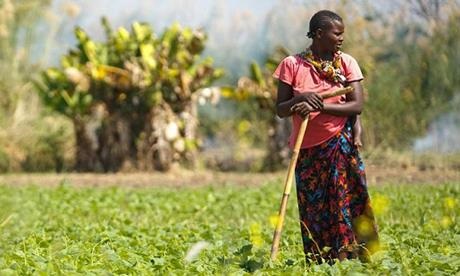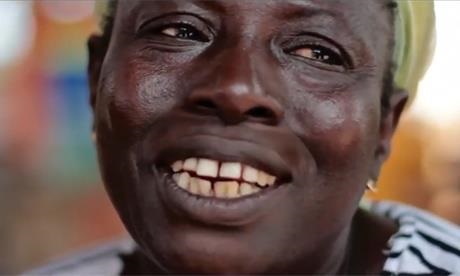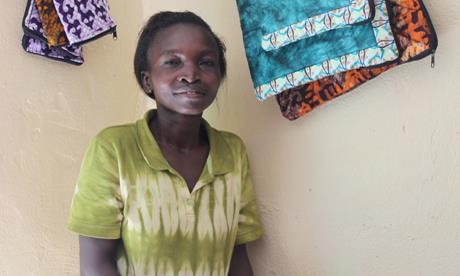Idées
Examen approfondi des travaux de la FAO en matière d'égalité des sexes et d'autonomisation des femmes
Target Zero Hunger Podcast: Spotlight on FAO Dimitra Clubs in Niger
12/04/2017
In communities throughout Niger, a quiet revolution is underway.

No assistance is too small: the story of Haja Sundu Marrah, a woman vegetable farmer in Sierra Leone
20/03/2017
She was just 17 when her parents forced her to become a housewife. Her husband already had two wives and children, as well as an extended family of relatives, dependents and apprentices.

Rural women in Europe and Central Asia: an interview with FAO's Cristina Amaral
17/03/2017
Cristina Amaral, Deputy Regional Representative for FAO in Europe and Central Asia, discusses the importance of women's rights and gender issues in the context of FAO's work in the region.

Women farmers and resilience in the face of climate change
08/03/2017
8th March is International Women’s day and this year’s theme is “Women in the Changing World of Work: Planet 50-50 by 2030”. In 2017 we are far from living on ‘planet 50-50’ with women holding less than 20% of the land in all the main developing regions o

Seedlings of hope: a coffee nursery in rural Uganda
08/03/2017
From clothing trader to coffee entrepreneur: Betty Ndugga has found a way to make a good living from agriculture, while also helping her community to prosper.

FTT-Thiaroye Ovens: Clearing the air for women fish processors in Côte d'Ivoire, and beyond
08/12/2016
A simple and relatively inexpensive technology is revolutionizing the way West Africans smoke their fish.

The female face of street food vending in Ghana
30/11/2016
Nanama is one of around 10 000 street food vendors in the city of Accra, Ghana, most of whom are women. Indeed, the face of street food vending is female in much of Africa.

Empowering rural leaders: a leadership school for indigenous women
22/11/2016
“It’s time for us indigenous women to break our silence. It’s time for us to speak up.”

Empowering rural women in Guatemala: “We are improving our family life.”
21/10/2016
Herlinda Caal Tzi is a 48-year-old Q’eqchi’ woman from rural Guatemala. She lives in the village of Panzós, in the country’s Alta Verapaz department, with her husband Tomás Cac, their three sons and two daughters-in-law.

Reaping the rewards of their labour: economic empowerment for women farmers in Nepal
20/10/2016
Chandra Kala Thapa is a thirty-year-old smallholder farmer living in Ranichauri, a village in the Sindhuli District of south-eastern Nepal. Like many women farmers here and in other parts of the developing world, she has faced a number of barriers to impr

Snapshot Liberia: “Saving my money for the future.”
19/10/2016
“I could not write my name. I did not understand how to do my business. I only did the business and was not saving any money.”

Snapshot Liberia: “I now understand my business...”
18/10/2016
“As a market woman, I never understood my business. But I now understand my business because I learnt about the importance of saving money.”

Snapshot Liberia: “I am capable of making an informed decision...”
17/10/2016
“Before the training, I was unable to manage money. I spent carelessly and did not even recognize that there is a future.”

Une expérience de réhabilitation des terres: l'effet catalytique des Clubs Dimitra au Niger
12/10/2016
Idrissa et son épouse Ramatou vivent dans le village de Tinkirana, dans la région de Tahoua, au Niger. Comme la plupart des hommes et des femmes de leur communauté et d'autres à travers l'Afrique subsaharienne, ils luttent chaque jour contre les effets du

Shared labour, shared rewards: men and women farming together in Sri Lanka
01/09/2016
“I am confident that this groundnut cultivation will help educate my children and earn a substantial income for my family” says Nelka Kumari Ariyasena.

Lightening the load: addressing rural women’s work burden and time poverty
12/07/2016
The division of labour in agriculture often follows traditional patterns. Across a variety of sectors, from smallholder farmers to pastoralists and from forest keepers to fishers, men and women usually have very different—though complementary—roles, with

Des femmes leaders grâce aux Clubs Dimitra de la FAO
30/05/2016
Depuis 2006, les Clubs Dimitra jouent un rôle crucial dans le renforcement des communautés rurales en Afrique sub-saharienne, avec un accent particulier sur l'autonomisation des femmes.

In Bangladesh: three women, three farmers, three tales of success
11/05/2016
Across the developing world, rural women play a crucial role in agriculture and farming. And Bangladesh, where women exceed 50 percent of the agricultural labour force, is no exception.

Gender Equality for a Zero-Hunger Generation
10/03/2016
An interview with Tacko Ndiaye, Senior Gender Officer in the Gender Equity and Rural Development Division at FAO, on the Zero Hunger Challenge Blog.

On International Women’s Day, recognizing women’s role in fisheries
08/03/2016
The Blue Growth Blog, run by the Fisheries and Aquaculture Department at FAO, reflects on recent activities related to women and their role in the sector.
